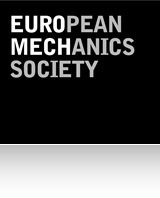Contributions
30 minutes are scheduled for each presentation.
As the colloquium is planned to be interactive, interruptions are possible at any time.
To prepare and facilitate the discussion, every speaker should submit 3-5 slides one week before the colloquium. The slides will be made available to all participants.
The slides will be provided to all participants.
|
Important dates: |
|
|
Abstract submission deadline: January 31, 2019 Registration deadline: February 28, 2019 |
|
Euromech Colloquium 600: |
March 12, 2019 |
|
Time |
Schedule |
|
|
|
|
13:00 h |
Small lunch and welcome |
|
14:00 h – 16:00 h Chair: |
Joris Remmers Multi-dimensional wavelet reduction of periodic micro-structural models |
|
Frank Naets, Wim Desmet An a-priori reduced order modeling approach for nonlinear finite element models in structural dynamics |
|
|
Sridhar Chellappa, Lihong Feng, Peter Benner Adaptive parameter sampling using surrogate error model |
|
|
Athanasios Antoulas The Loewner framework: a new approach to data-driven modeling and reduction |
|
|
16:00 h – 16:30 h |
Coffee break |
|
16:30 h – 18:00 h Chair: |
Andrey Nasedkin About some features of finite element modelling of piezoelectric composites at micro-level |
|
A. K. Jha, C. S. Upadhyay Solving exotic engineering problems – brute force versus elegant modelling and analysis |
|
|
Stefanie Reese, Hamid Reza Bayat, Oliver Barfusz and Stephan Wulfinghoff Similarities between the discontinuous Galerkin approach and reduced integration methods |
|
|
18:15 h – 20:00 h |
Reception |
|
|
|
|
Euromech Colloquium 600: |
March 13, 2019 |
|
Time |
Schedule |
|
|
|
|
09:00 h – 10:30 h Chair: |
Sven Klinkel, Rainer Reichel A polygonal element formulation based on the scaled boundary method for the analysis of nonlinear problems in solid mechanics |
|
Hoang-Giang Bui, Günther Meschke, Dominik Schillinger Efficient cut-cell quadrature based on moment fitting for materially nonlinear analysis |
|
|
Fadi Aldakheel, Blaž Hudobivnik, Peter Wriggers Virtual element formulation for phase-field modeling of brittle and ductile fracture |
|
|
10:30 h – 11:00 h |
Coffee break |
|
11:00 h – 12:30 h Chair: |
Christian Wieners, Kerstin Weinberg A discontinuous Galerkin method for the elastic wave equation and the application to the phase-field approximation of interfaces |
|
Olivier Brüls Geometric nonlinearities and the local frame approach in structural mechanics |
|
|
Thomas-Peter Fries, Daniel Schöllhammer Classical shell analysis based on tangential differential calculus |
|
|
12:30 h – 14:00 h |
Lunch |
|
14:00 h – 15:30 h Chair: |
Matteo Giacomini, Ruben Sevilla, Antonio Huerta From low to high-order hybridizable discontinuous Galerkin approximations in computational mechanics |
|
Julien Leclerc, Van Dung Nguyen, Ludovic Noels Damage to crack transition for ductile materials using a cohesive-band / discontinuous Galerkin framework |
|
|
Franz Chouly Nitsche’s method for contact and friction |
|
|
15:30 h – 16:00 h |
Coffee break |
|
16:00 h – 18:00 h Chair: |
Pedro Díez, Alberto García-González, Sergio Zlotnik, Antonio Huerta Algebraic tools for parametric problems: supplementing finite elements with the parametric dimension |
|
Johannes Riesselmann, Jonas Ketteler, Mira Schedensack, Daniel Balzani A C0-continuous finite element formulation for finite gradient elasticity |
|
|
Kerstin Weinberg, Carola Bilgen, Christian Wieners Phase-field simulations of cracks growth in different materials |
|
|
Thomas Wihler Energy based adaptivity in variable-order FEM |
|
|
|
|
|
19:00 h |
Conference dinner |
|
Euromech Colloquium 600: |
March 14, 2019 |
|
Time |
Schedule |
|
|
|
|
09:00 h – 10:30 h Chair: |
Ramon Codina, Ino Castañar, Joan Baiges Approximation of incompressible elastic materials at large strains using stabilized finite element methods |
|
Peter Hansbo Augmented Lagrangian methods for nonlinear problems |
|
|
Beverley Grieshaber, Faraniaina Rasolofoson, Daya Reddy Convergent approximations for near-incompressible and near-inextensible transversely isotropic elasticity |
|
|
10:30 h – 11:00 h |
Coffee break |
|
11:00 h – 12:30 h Chair: |
Gianluigi Rozza Reduced order methods for PDEs: state of the art and perspectives with applications in computational mechanics |
|
Mauricio Fernández, Felix Fritzen On hybrid approaches combining reduced order modeling and artificial neural networks for multiscale mechanical simulations |
|
|
Hamid Reza Bayat, Hans-Philipp Schreyer, Shahed Rezaei, Stefanie Reese Interface failure modeling applying cohesive discontinuous Galerkin method |
|
|
12:30 h – 14:00 h |
Small lunch |
|
|
|
|
14:00 h – 17:00 h |
Excursion |
